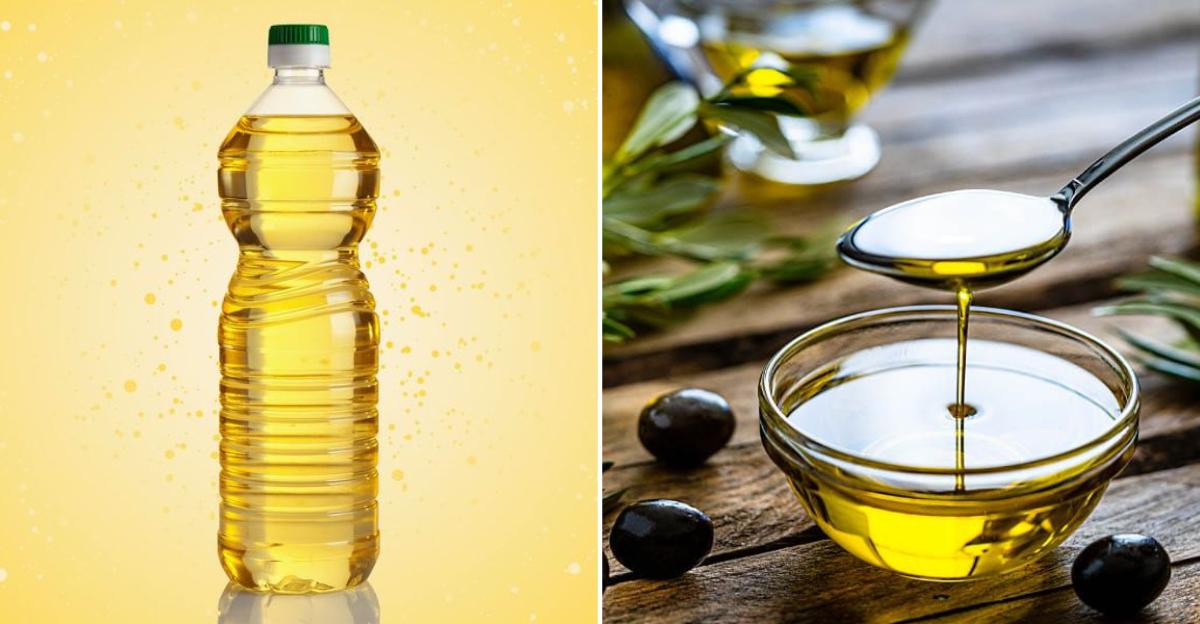10 Cooking Oils Ranked By Health Value, From Worst To Best

Cooking oils can make or break your health goals. Some boost heart health while others might actually harm your body over time.
With so many options lining grocery store shelves, figuring out which oils deserve a spot in your kitchen can be confusing.
Here’s a straightforward ranking of popular cooking oils from least healthy to most beneficial for your body.
1. Vegetable Oil Blend: The Kitchen Troublemaker
Those innocent-looking bottles labeled simply “vegetable oil” are actually a mix of highly processed soybean, corn, and cottonseed oils. Packed with inflammatory omega-6 fats, these oils can throw your body’s balance out of whack.
The refining process strips away nutrients, while chemicals are often used during extraction. When heated, these oils easily oxidize, creating harmful compounds that may contribute to health problems over time.
2. Palm Oil: Environmental Villain with Health Drawbacks
Bright orange palm oil might seem exotic, but its health profile isn’t impressive. Loaded with saturated fats that can raise your “bad” cholesterol levels, this oil comes with baggage beyond nutrition.
Harvesting palm oil has led to massive deforestation in tropical regions. While it has a high smoke point, making it stable for cooking, the environmental and health costs are significant.
Some palm oil is sustainably sourced, but it’s still not a top health choice.
3. Coconut Oil: Tropical Temptation with Mixed Reviews
Coconut oil might smell like a beach vacation, but with 82% saturated fat, it’s no nutritional paradise. Despite trendy claims, research shows it can raise LDL cholesterol similar to butter.
The medium-chain triglycerides (MCTs) in coconut oil do offer some benefits, but they’re only a small portion of what’s in the jar.
Save this tropical oil for occasional baking or beauty treatments rather than everyday cooking. Your arteries will thank you!
4. Butter: Grandmother’s Go-To with Modern Cautions
The creamy, rich flavor of butter has delighted taste buds for centuries. Real butter contains vitamin A and D, but also comes packed with saturated fat and cholesterol that can clog arteries over time.
Butter shines at low temperatures—think toast or finishing sauces. It begins to burn at just 350°F, creating harmful compounds.
For heart health, consider butter an occasional treat rather than your daily cooking companion. Sometimes the classics need moderation!
5. Ghee: Butter’s Sophisticated Cousin
Ghee, the golden clarified butter from Indian cuisine, removes milk solids and water from regular butter. This transformation creates a higher smoke point (485°F) while concentrating fat-soluble vitamins A, E, and K.
The removal of milk proteins makes ghee suitable for some with dairy sensitivities. However, ghee still contains significant saturated fat.
The nutty flavor enhances dishes beautifully, but moderation remains key for heart health.
6. Peanut Oil: The Frying Favorite with Benefits
Wok masters treasure peanut oil for its high smoke point and subtle nutty flavor. Containing mostly monounsaturated fats, the heart-healthy kind, peanut oil offers more benefits than many common cooking oils.
Rich in vitamin E, this oil helps fight inflammation and oxidative damage. The high smoke point (450°F) makes it ideal for stir-frying and deep-frying without breaking down.
Just be cautious if allergies are a concern in your household because this oil isn’t for everyone!
7. High-Oleic Sunflower Oil: The Upgraded Classic
High-oleic versions contain more monounsaturated fats (like olive oil) and fewer polyunsaturated fats than regular sunflower oil.
This clever modification creates an oil that’s more stable when heated and better for heart health. Packed with vitamin E, a powerful antioxidant, this oil helps protect cells from damage.
The neutral flavor works well in everything from baking to sautéing, making it a versatile kitchen ally.
8. Canola Oil: The Underrated Heart Helper
Canola oil deserves more credit than it gets! With the lowest saturated fat content of any common cooking oil and a favorable omega-3 to omega-6 ratio, it’s quietly supporting heart health in kitchens everywhere.
The FDA has approved heart health claims for canola oil—a rare distinction. Look for cold-pressed versions to avoid chemical processing.
Its mild flavor and medium-high smoke point (400°F) make it perfect for everyday cooking, from salad dressings to baking.
9. Avocado Oil: The Luxurious All-Purpose Champion
Pressed from the creamy flesh of avocados, this oil is the kitchen equivalent of a superhero. With an impressive 520°F smoke point, the highest of any plant oil, it handles everything from high-heat searing to delicate salad dressings.
Avocado oil’s rich supply of monounsaturated fats supports heart health, while lutein benefits eye health. The mild, buttery flavor enhances food without overwhelming it.
The price tag may be higher, but the versatility and health benefits make it worth every penny.
10. Extra Virgin Olive Oil: The Mediterranean Gold Standard
The undisputed champion of healthy oils comes straight from olive groves around the Mediterranean. True EVOO contains over 30 antioxidant compounds that fight inflammation and protect your heart.
Studies show it lowers bad cholesterol while raising good cholesterol, a rare double benefit. Contrary to popular belief, quality olive oil handles moderate cooking heat just fine (up to 375°F).
The robust, peppery flavor of fresh EVOO signals the presence of oleocanthal, a natural compound with effects similar to ibuprofen.
